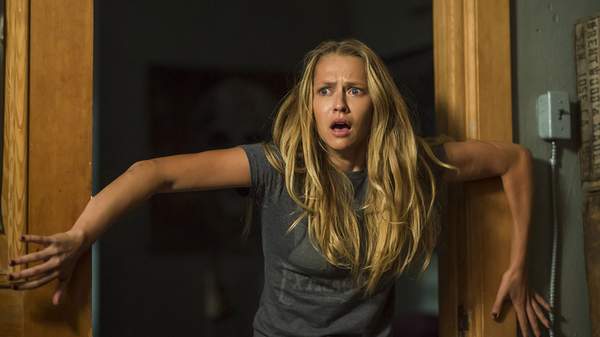Overview
If all a horror movie needed was a killer concept, then Lights Out would sit at the top of the spooky cinematic heap. At its core is an idea that's equally obvious, ingenious and universal: the unsettling feeling that springs in children and adults alike when a flick of a switch plunges a room into darkness. In fact, when Swedish filmmaker David F. Sandberg first toyed with the notion in his two-and-a-half-minute short film of the same name, it became a viral sensation, catching the eye of horror producer James Wan in the process. Three years later, Sandberg has fleshed out the attention-grabbing effort into his feature film debut.
In Lights Out, stressing about whatever sinister presence just might lurk in the shadows isn't simply a sign of anxiety or an overactive imagination, as Rebecca (Teresa Palmer) and her ten year old brother Martin (Gabriel Bateman) come to realise in the wake of a family tragedy. Initially, Martin isn't overly concerned when his grief-stricken mother, Sophie (Maria Bello), starts speaking to someone who isn't there. But then he spies a ghostly figure that only appears when his lamp turns off. When he flees his dimly lit home to stay in Rebecca's apartment, she starts seeing the apparition too.
It's enough to make them jump, run and scream repeatedly, in a movie that knows how to make the most of its unnerving moments. Indeed, although writer Eric Heisserer seems fairly content to keep playing in formulaic territory after penning the recent remakes of both A Nightmare on Elm Street and The Thing, Sandberg perfects the ominous look, uneasy mood and expert sense of timing that a film about things going bump in the dark requires.
More specifically, Sandberg's spot-on directorial choices include a focus on the obvious but essential: if you're going to call a film Lights Out, you have to master the many flickers and silhouettes that tend to come with luminous bulbs and the like. From the glow of exterior lighting shining down on an eerie-looking warehouse in the film's opening shot, to the contrast of every high- and low-wattage source of brightness you can think of against gloomy interior surroundings, the movie becomes a striking exercise in setting a specific tone through lighting and cinematography. As a result, what it lacks in narrative surprises, it makes up for in successful scares and inventive imagery.
Thankfully, the small but spirited cast follows suit, even though they're largely saddled with cookie-cutter horror roles. No time is wasted on jostling for laughs or taking things too seriously, with the 81-minute feature proving an example of economical yet mostly effective filmmaking. Accordingly, even as Palmer's heroine makes more than a few predictable choices, and Bello's frazzled parent does the same, they're both pitched at just the right, relatable level.
